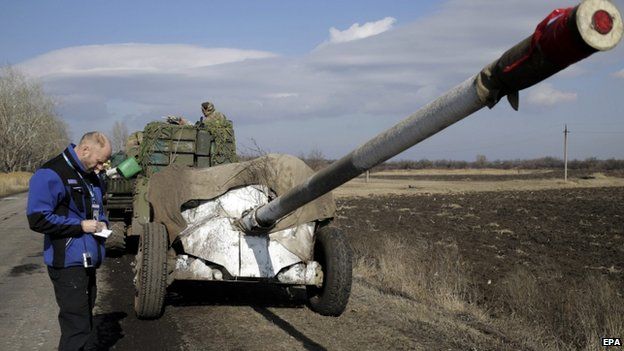Ukraine crisis: Rebels 'pull heavy weapons' from front line
- Published

Pro-Russia rebels in Donetsk, eastern Ukraine, say they have "fully removed" heavy weapons from the front line, as agreed in a ceasefire deal.
The claim was made by the head of the self-proclaimed Donetsk People's Republic, Alexander Zakharchenko, who added that Ukraine had not reciprocated
Ukraine's government said it would move its artillery by the end of Saturday.
The European-brokered ceasefire signed in Minsk last month appears to be holding despite sporadic violations.
"We have withdrawn from the contact line all arms with a calibre of over 100mm," Mr Zakharchenko said on Saturday. "Unfortunately, Ukraine has not done that."
Observers from the Organization for Security and Co-operation in Europe (OSCE) are monitoring the ceasefire agreed in Minsk, Belarus, on 12 February.
The two sides are due to create a buffer zone between them of at least 50km (30 miles) for artillery of 100mm calibre or more, 70km for multiple rocket systems and 140km for the heaviest rockets and missiles.
In recent weeks, the two sides have exchanged dozens of prisoners as part of the Minsk peace plan.
The deal also recognises self-rule for rebel-held parts of Donetsk and Luhansk regions, and calls for talks on their long-term status.
The UN estimates that least 6,000 people have been killed since the conflict in Ukraine's eastern Donetsk and Luhansk regions erupted last April, although it says the number of fatalities could be much higher.
On Friday, Ukrainian government sources told the BBC they believed Russian troops were still entering the country.
Ukraine and Western countries have said there is clear evidence that Russia is helping the rebels with heavy weapons and soldiers.
Independent experts echo that accusation. Moscow denies it, insisting that any Russians serving with the rebels are "volunteers".
So what is in the Minsk ceasefire plan?
•Immediate ceasefire
•Buffer zone separating heavy weapons of both sides. Before, big guns had to pull back by 15km (9 miles)
•Now, minimum buffer zone of 50km for 100mm artillery and up to 140km for rockets
•Effective verification by international security group OSCE
•Amnesty and release of all hostages and illegally detained people
•Restoration of government pensions and other welfare payments for civilians in the east
•Full Ukrainian control over eastern border, after local elections under Ukrainian law and a constitutional deal on future of Donetsk and Luhansk by end of 2015